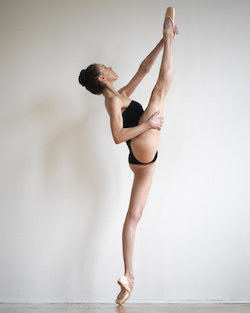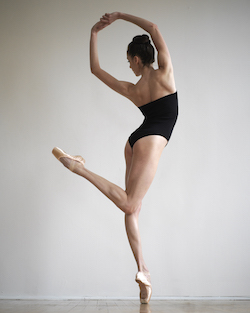
American Ballet Theatre’s Kathryn Boren. Photo by Chung-Lin Tseng.
So many young dancers dream about it – that day they’ll be promoted to the corps of a major ballet company. It can only go up from there, right? Yet not all corps members become principal dancers. Even if they do, it’s a long road of incredibly hard work and 100 percent focused dedication. There’s also a fundamental tension at work here; as a member of the corps, one is to be part of a uniform group of dancers – and not stick out from the crowd. Yet, given that, how is a corps dancer to stand out and be seen, allowing him or her to move up the ranks? It can also be all too easy to get demoralized, and lose inspiration for working hard at your art, when you feel like one in a pack of many other dancers. Kathryn “Katie” Boren, American Ballet Theatre corps de ballet member, shared with Dance Informa how she makes herself seen and stays inspired.
Boren says that she always remembers what someone once told her, to “always dance like the spotlight is on you, even if you’re in the corps.” She agrees that at any point, in rehearsal or performance – even if you are in the corps – someone could be intently watching you. Boren also specifically recommends dancing in rehearsal as if you’re performing. Marking has its uses, but try to do it only rarely! “If you look like you’re having a wonderful time in rehearsal, you’ll stick out from the crowd in a great way,” Boren adds. In regards to effective demeanor when dancing, Boren also recommends taking acting classes, if at all possible. This can be particularly useful for getting cast and dancing in story ballets.

American Ballet Theatre’s Kathryn Boren. Photo by Nisian Hughes.
Boren also recommends learning from your colleagues, both in rehearsal and on stage. Toward the latter, most companies offer free tickets to company members. Besides being able to enjoy top-notch professional performances, you can observe the nuances of your colleagues’ artistry – and from there perhaps be able to apply aspects of their craft to your own. Attending performances can also re-light your creative fire. Additionally, attending performances also shows that you’re a “team player”, that you’re supportive of your company.
She also advises corps members to “make yourself useful – learn everything you can, and be ready to take on different parts,” in case you may be called at the last minute to dance a role. You might get to perform certain roles here and there that you might not have otherwise gotten to dance. Beyond that, artistic directors and other administrators will come to see you as dependable and motivated. “You become a go-to person,” Boren affirms, adding that taking other types of dance classes – jazz, modern, cultural dance forms – can also make you a “go-to person” through expanding your versatility. If administrators know that you have that versatility to dance a jazzier or more contemporary role, they’re more likely to consider you for it and potentially cast you in it.
Being seen as having those attributes, along with an ability to quickly learn and retain choreography and various other aspects of roles, can also have you at top of mind when company administrators are considering making promotions. To keep in mind with all of this, of course, is not taking on too much, in order to avoid burnout. For self-care that can help prevent burnout, Boren advises finding interests and people in your life outside of dance and the arts. “Go to the beach!” she says, if that may be what re-fuels and restores you. Toward other mental and emotional difficulties of dancing in the corps, Boren also acknowledges that she often experiences feelings like that she’s only one in a crowd or that she’s danced a certain corps role a hundred times before. Yet she attests that she can get past those feelings.

American Ballet Theatre’s Kathryn Boren. Photo by Nisian Hughes.
“Bring yourself back to your passion,” she encourages. She also recommends finding something special in every performance – a friend or a family member in the audience, a celebration of a great day, a turning around of a hard day. In contrast, a ritual before performance – something that you do before every curtain, something in common to every time you perform – can be grounding and comforting.
“It’s such a short career, and you can’t please everyone,” Boren says, “so enjoy what you can, while you can.” Whether one moves up from the corps or not, that seems like quite solid, useful advice. Wherever or whatever you’re dancing, try to enjoy the dance.
By Kathryn Boland of Dance Informa.













